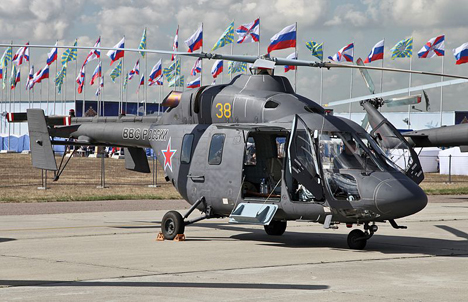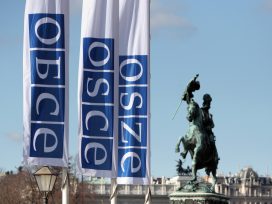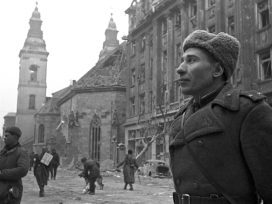That Russia will never be a superpower as the USSR once was leaves it searching for a new international identity. Fyodor Lukyanov argues that Moscow’s policy today is a skilful imitation of striving for global status, intended to conceal the narrowing of the sphere of its immediate interests.
Russia’s foreign policy is a source of constant speculation and misunderstandings in the West. They have especially increased after Vladimir Putin returned to the post of president. But if we strip away emotions and stereotypes associated with both Putin and the historical perception of Russia, we will see that the Kremlin’s international policy is not what it is believed to be. Russia’s foreign-policy identity is changing – Russia is finally departing from its Soviet-era global self-perception. This is a painful process and, to facilitate it, the Russian authorities are creating a smokescreen.

100th Anniversary of the Russian Air Force. Photo: Vitaly V. Kuzmin. Source: Wikimedia
If we use the classical phrase by Chancellor Alexander Gorchakov, Russian foreign minister in the mid-nineteenth century, Russia is again “collecting itself”. The post-Soviet era, when Russia’s foreign policy was meant to prove that the country had been removed prematurely from the list of global players, is over. Russia did its best and has returned to the ranks of countries that cannot be ignored. Yet, Russia is not the Soviet Union, and it will never be a superpower again in the sense that the USSR was a superpower. Russia’s task for the years to come is to narrow the horizon and transform into an influential yet regional power. But this will be no small power, as the Russian “region” represents the whole of Eurasia, a huge space, where it will have to find a niche for itself.
Changing the space where the game is played is a difficult process. On the one hand, this is a psychological problem: over the twentieth century, the Russian mind became accustomed to perceiving Russia as the arbiter of the destinies of the world – ideologically and geopolitically. A sharp renunciation of this status may provoke an unpredictable reaction, including even outbursts of revanchism. On the other hand, a demonstrative withdrawal from the “Big Game” would be taken by many people as a surrender and would definitely be a voluntary renunciation of instruments that could be applied to ensure favourable conditions for wielding power at regional level. For example, if Russia retains levers of global influence, it can swap its constructive position on some issues for non-interference by other major countries in the sphere of its vital interests.
Moscow’s policy today is, in fact, a skilful imitation of striving for global status, intended to conceal the narrowing of the sphere of its immediate interests. Here are the three most glaring examples of this imitation.
The BRICS concept is a witty construct that allows Russia to wrap its entire policy in a veil of new globalism. The formalization of this alliance of countries (Brazil, Russia, India, China and South Africa) that are by all criteria totally different from one another is impossible. But this is not really necessary, because the very fact, or even the perception, of any joint activity by several major countries pursuing independent policies attracts the anxious attention of other actors. An amazing paradox has occurred with regard to BRICS. The very idea to unite these different countries into one group belongs to the Goldman Sachs investment company, which came up with it almost 10 years ago to advertise its own services in emerging markets. Since then, the investment meaning has been lost; however, the countries united by the acronym eagerly seized the idea and filled it with a different meaning – a geopolitical one. The secret of the success of a format that was artificially invented by bankers and taken up by politicians in those countries lies not in its viability but in that it has personified the hidden yet growing fear of the West that it may lose its global leadership. For Russia, which no one views as a formidable BRICS member in economic terms any longer, this is a perfect opportunity to assert itself as a potential architect of a new world order, even if it is not going to participate in its creation, and to alleviate the suffering of those Russians who take heavily Russia’s parting with its imperial grandeur.
Another example is Syria, where we are witnessing a major diplomatic collision. Its ultimate goal, however, is not at all what it seems to be. Contrary to the belief of many people in the West, Moscow is not defending its economic or geopolitical positions in the Middle East. In fact, it seems to be withdrawing from the region. After all, Russia has nothing to do there without the socialist ideological content of Soviet policy and without the geopolitical greed that was characteristic of the Soviet Union in the era of its all-out competition with the United States. That part of the world is turning into an unpredictable powder keg, which the United States and Europe, in contrast to Russia, cannot leave despite the risks involved – it is a sphere of their vital interests. By refusing to budge on Bashar al-Assad, the Kremlin is sending a signal that no problem can be solved anywhere without its assistance and that the West should better keep this in mind for the future. And if the New and the Old Worlds get bogged down there, so much the better: Washington and Brussels would have less time and strength to entice territories that Russia is not going to leave, something that has special relevance to the countries of the former Soviet Union.
And finally, the Eurasian Union, which is nothing more than a hollow name. In fact, it is not about some “special path” across the boundless steppes or about restoring an empire. It has nothing to do with the ideology of Eurasianism, which is based on the tradition of anti-Western cultural and political thinking of the nineteenth and twentieth centuries, although its adherents are happy about Putin’s proposal. Rather, it will be modelled on the European integration of the mid-twentieth century in its original form. The only country whose membership would be economically feasible and politically advantageous is Ukraine, but this is not Eurasia at all. Central Asian countries standing in line for membership, above all Tajikistan and Kyrgyzstan, have received hints that they are not welcome yet. But the name itself pleases the ear, because it evokes dreams of a big project. Incidentally, there are doubts even about Kiev – many say that, with Ukraine as a member, Russia would simply have a Trojan horse that would sabotage everything it can. Until recently, Uzbekistan played this role in the Collective Security Treaty Organization (a military-political alliance led by Russia).
Under the cover of distracting manoeuvres, Russia is formulating its new international identity. Relegation to the regional league is a shock. It is neither easier nor more difficult to play there; it simply requires different skills. The Kremlin masterfully performs intricate manoeuvres in the UN Security Council or in negotiations on strategic offensive arms reductions. But to censure Tajikistan in 2011 for the confiscation of a Russian plane and the arrest of its pilots, Moscow had to resort to very clumsy tactics. Russia’s chief public health official, Gennady Onishchenko, publicly expressed suspicions then that Tajik migrants coming to Russia were bringing many diseases with them. Simultaneously, it was made clear to Dushanbe that Moscow might start deporting Tajik migrants, which would have been an explosive issue for Tajikistan to handle. The pilots were released. But the seizure of assets of Russia’s MTS telecommunications company in Uzbekistan in the summer of 2012 nonplussed the authorities. Moscow does not know what to do in this case. However, emotions apart, the trajectory of the post-Soviet development of Russia’s foreign policy is quite natural. Over time, Russia will develop the required skills and ability to match its desires to its capabilities.
Generally speaking, Putin’s foreign policy, which until recently enjoyed broad, almost universal, support in the country is exhausting itself. It is reactive, that is, it responds almost exclusively to external impulses, rather than generating initiatives of its own. It is mostly cautious, although richly flavoured with harsh statements. Its central notion is prestige – strengthening it is valuable in itself. Putin’s Russia values freedom of action and seeks to avoid binding alliances by constantly manoeuvring between the West and the East. Its predominantly anti-Western rhetoric goes hand in hand with a desire to cooperate mainly with Western partners. Russians appreciate that Putin has restored the nation’s self-confidence after the humiliations and failures of the 1990s. However, the universal policy towards “revival in general” and the strengthening of prestige does not meet the full range of Russia’s interests, and soon there will arise a demand for a more purposeful and prudent foreign policy, aimed at achieving concrete goals. But the formulation of these goals will most likely not bring about a strong unity of views, as before. Society is becoming more mature and is no longer willing to follow the general party line.
Published 28 June 2013
Original in English
First published by IWMpost 110 (2012)
Contributed by Transit © Fyodor Lukyanov / IWM / Eurozine
PDF/PRINTPublished in
In collaboration with
In focal points
Newsletter
Subscribe to know what’s worth thinking about.
Related Articles

From Helsinki to full-scale invasion
Russia, European security and the OSCE
Russia’s invasion of Ukraine, and its denial of rights at home, are precisely the kind of development that the Organization for Security and Co-operation in Europe was set up to prevent. So why has the OSCE failed to fulfil its purpose?

Two opposing interpretations of 1945 form the ideological core of today’s confrontation between Russia and the states of central and eastern Europe. Both are reactions to the collapse of the Cold War order.






